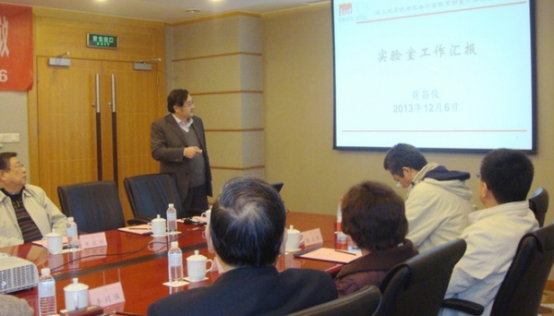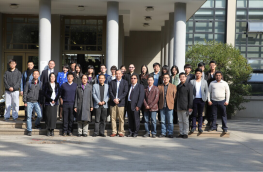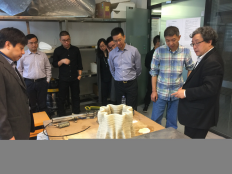1)MOEKey Laboratory of Road and Traffic Engineering
Official certification:
Open Laboratory, Ministry of Education since 1993
Key Laboratory, Ministry of Education since 2000
The Road and Traffic Engineering Laboratory, is the earliest key laboratory established by the Ministry of Education in the field of road and traffic engineering.
Major research directions:
(1) Road and railway engineering. In response to the synergy of high speed, heavy loads and complex environment, the Laboratory carries out researches on basic theories of mechanical analysis of land engineering, dynamic behavior and mechanical characteristics of materials. These provide a theoretical basis for the design of structures and materials of roads, railways and airports, subgrade design, facility reclamation technology, evaluation and management, etc.
(2) Transportation planning and management. The Laboratory addresses road and railway traffic network planning by keeping track of the theories and applications of traffic engineering in fields including but not limited to: road infrastructure management; road traffic management; urban traffic theories; systematic planning of highways. Having been tasked with a large number of research and development projects by national ministries and local governments, the Laboratory has branched into fields of urban logistics, urban rail transit management, intelligent transportation system planning, etc.
(3) Traffic information engineering and control.With a solid background in road traffic information engineering, road traffic system management, urban traffic real-time adaptive control system and traffic guidance, intelligent transportation system (ITS), etc., the Laboratory focuses on the following areas:
Ø traffic control system;
Ø intelligent traffic system;
Ø traffic monitoring and management system;
Ø road traffic information and control system;
Ø information and communication technology;
Ø system integration technology;
Ø railway and urban rail traffic signals;
Ø train automation.
Please visit https://kyy.tongji.edu.cn/zdsys11/jybzdsys/dlyjtgcjybzdsys.htm (in Chinese) for more information.
2) MOE Key Laboratory of Yangtze RiverWater Environment
The Laboratory addresses key water environment issues and frontiers of the Yangtze River valley through multidisciplinary coordination and international cooperation, seeking to build a top-class laboratory of international importance. The vision of the Laboratory is to take the lead in applied basic research while responding to the needs of the state government with high technology development. The laboratory has an on-campus experimental center and two research bases (in Chongdao and Yibin, respectively) with advanced instruments and equipment. The newly-built Yangtze Environmental Sample Bank (YESB) provides soil, sediment, biological and breast milk samples for the study of water ecological environment quality in the Yangtze River.
Home to nearly one-third of China’s population, the Yangtze River has been beset with challenges arising from the rapid economic progress and some key water development projects along the basin. To tackle the crucial challenges of water quality safety and the ecological evolution, the Laboratory conducts basic research and technological innovation in the Yangtze River Basin in the following areas:
Ø evolution and ecological response of the water environment;
Ø prevention and control of pollution and ecological restoration;
Ø the utilization and safety of water resources;
Ø water environment management.
In 2003, the Laboratory also initiated an interuniversity working group on Yangtze River water environment composed of eight universities in China, and the 12 consecutive annual seminars convened under this mechanism has become an important platform for research in the relevant fields. The technological outputs and talents have provided valuable input for policymakers in the protection, conservation and utilization of water resources of the Yangtze River, contributing to economic and social sustainability along the river.
The Laboratory operates on an open, dynamic, coordinated and competitive mechanism in promoting talent development, attraction and innovation. A case in point is our tradition of providing full access to undergraduate and graduate students. The Laboratory also attaches great importance to international exchange. A long-term cooperative mechanism for talent development has been built with partner institutions in Germany, Sweden, Canada, Japan and Africa. Under the China-Germany-Africa, China-Japan-South Korea, and China-Canada partnerships, TU students of various levels are dispatched overseas on short-term exchange programs while international students come to TU. Such an internalization approach to talent development and cooperation is a striking feature of the Laboratory.
For more information please visit https://yangtze.tongji.edu.cn/ (in Chinese).
3)MOE Key Laboratory of Advanced Civil Engineering Materials
Approved by the Ministry of Education in 2005, the key Laboratory of Advanced Civil Engineering Materials is well equipped with a number of large-scale devices housed in laboratory room totaling 5,000 sqm, enabling the team to implement some key state-level projects (such as National Basic Research Program of China, or Program 973; State High-Tech Development Plan, or 863 Program; Key Program of the National Natural Science Foundation of China) as well as key technological advancement projects supported by ministries and local authorities.
The Laboratory conducts research in the following areas:
Ø composition, structural optimization and mechanical behavior of civil engineering materials;
Ø functional design theory and application of civil engineering materials;
Ø design, preparation and application of energy-saving materials in civil engineering;
Ø solid waste recycling and recycling of civil engineering materials.
Quick Facts:
The Laboratory is supported by the following academic resources of Tongji University.
Doctoral programs:
Ø materials science,
Ø material physics and chemistry,
Ø material processing engineering,
Ø structural engineering,
Ø engineering mechanics.
State key disciplines:
Ø materials science,
Ø structural engineering,
Ø engineering mechanics
Post-doctoral research programs:
Ø materials science and engineering,
Ø civil engineering.
| Size of regular staff | 54 |
| Winners of the National Science Fund for Distinguished Young Scholars | 4 |
| Distinguished professors | 2 |
| Professors | 42 |
| Doctors of Philosophy | 49 |
| Postgraduate students | over 300 |
For more information please visit https://acem.tongji.edu.cn/ (in Chinese).
4) MOE Key Laboratory of Embedded System and Service Computing
The Key Laboratory of Embedded Systems and Service Computing of the Ministry of Education was established in December 2005. Taking a multidisciplinary paradigm to the basic research as well as the integration of embedded systems and service computing, the Laboratory seeks the international frontier of technological innovation to address the needs of the regional economy and national strategies. The main research fields include embedded technology, service computing, information transmission and integration, and intelligent information application technology.
The Laboratory has undertaken over 200 National Basic Research Program of China (Program 973), State High-Tech Development Plan (863 Program), and Shanghai-level and ministerial-level natural science foundation projects. Over 100 papers has been published in international journals. The Laboratory has won a number of awards for its research and development, including one Second Prize for National Award for Technological Invention, one Second Prize for NationalScience and Technology Progress Award, and 17 other provincial and ministerial scientific and technological progress awards.
| State-level talent programs | |
| Thousand Talents Program | 8 |
| Chief Scientists of Project 973 | 2 |
| Distinguished professors | 3 |
| Hundred Talents Programof Chinese Academy of Sciences | 1 |
| Other kinds of talent programs | 40 |

For more information please visit https://essc.tongji.edu.cn/ (in Chinese).
5)MOE Key Laboratory ofGeotechnical and Underground Engineering
Supported by the state key discipline of Geotechnical Engineering, the Key Laboratory of Geotechnical and Underground Engineering of Ministry of Education provides an important platform for research and development. At present, there are three main research fields in this key laboratory: Theory of Soft Soil Mechanics and Soft Soil Engineering Catastrophe Control, Macro and Micro Soil Mechanics Theory and Environmental Multi Field Coupling, Theory and Technology of Underground Space and Engineering Safety Control. With a floor area of about 3,613 sqm (38,890 sq. ft), the Laboratory consists of the following five experiment platforms:
Ø soil mechanics attributes and basic theories,
Ø rock mechanics attributes and basic theories,
Ø physical modeling for soft soil engineering,
Ø physical modeling for tunnel structure and rock underground engineering,
Ø digital geotechnical and underground engineering.
The key laboratory has a close academic relationship and frequent exchanges with famous international universities and research institutions. Since 2011, the Laboratory has hosted 17 international academic conferences and has been visited by a number of international scientists. By actively promoting international academic exchange in geotechnical and underground engineering, the Laboratory has grown into an internationally renowned research center for geotechnical and underground engineering.
Quick Facts:
Key disciplines:
Ø geotechnical engineering (state key discipline, Shanghaikey discipline)
Ø geological engineering (Shanghaikey discipline)
Doctoral programs and post-doctoral research programs:
Ø geotechnical engineering
Ø tunnel and underground engineering
Ø geological engineering
| Size of regular staff | 67 |
| Winners of the National Science Fund for Distinguished Young Scholars | 2 |
| Distinguished professors | 2 |
| Professors and AssociateProfessors | 56 |
| Full Professors | 37 |
| Membersof Chinese Academy of Sciences | 2 |
| Lecturers | 8 |
| Doctors of Philosophy | 57 |
For more information please visit https://geotec.tongji.edu.cn/keylab/(in Chinese).
6)MOE Key Laboratory of Ecology and Energy-saving Study of Dense Habitat
Based on the College of Architecture and Urban Planning of Tongji University, the Key Laboratory of Ecology and Energy-saving Study of Dense Habitat is established by integrating the following existing scientific research bases: the State Professional Laboratory of Modern Technology of Urban Planning,World Heritage Institute of Training and Research for the Asia and the Pacific Region under theauspices of UNESCO (WHITRAP), the Architectural Acoustics Laboratory, the Visual and Lighting Art Laboratory, the Plastic ArtsLaboratory, the Advanced Urban Energy and Environmental Control Laboratory and several other research institutes and research centers.
The Laboratory strives to become an international platform for the research in ecological habitat environment while assuming the crucial task of independent innovation in national habitat construction. It is of great strategic significance for accelerating the construction of the platform for the research in national habitat construction, improving the capacity for independent innovation, and promoting the comprehensive, coordinated and sustainable development of urban and rural construction.
Seeking the harmonious development of urban and rural areas and the efficient utilization of resources, the Laboratory will conduct research in theecology and energy conservation of dense habitats, with fields of research revolving around the development prediction and dynamic monitoring technology of dense urban areas, the integration technology of ecological simulation of urban buildings, the diagnosis of existing buildings and historical buildings and ecological renovations. A multi-disciplinary and multi-level cluster approachwill expectedly improve the capacity of basic research and theoretical research, and provide technical support and input for decision-making for the healthy development of urbanization and the construction of a resource-efficient and environment-friendly society.


For more information please visit https://caup-lab.tongji.edu.cn/(in Chinese).
7)MOE Key Laboratory ofArrhythmia
Established by Tongji University in February 2009, the Key Laboratory of Arrhythmia of the Ministry of Education was examined by the Ministry of education in November 2011. Over the years, the Laboratory has made such great progress that it became a certified key laboratory of the Ministry of Education in 2016.
With a total floor area of 3,800 sqm (40,902 sq.ft), the Laboratory is composed of one hospital campus and one university campus, the former seeking to solve clinical scientific problems by means of basic research and realize the transformation from basic to clinical practice. The latter capitalizes on the synergy between the university and the strength of basic research with a view to achieving interdisciplinary and independent innovation.
There are four research directions in the laboratory:
Ø 1. Molecular biology of heart diseases: focusing on the molecular mechanism of heart diseases;
Ø 2. Cell biology of heart diseases: focusing on the cell mechanism of heart diseases;
Ø 3. Developmental biology of heart diseases: focusing on the development mechanism of heart diseases;
Ø 4. Translational medicine of heart disease: focusing on the study of clinical transformation of heart diseases.
The Laboratory has established over 10 relatively independent research groups in the research of cardiovascular diseases. Most of the principal investigators (PIs) have overseas experience and nearly half of them have published papers in top journals of Nature, ScienceorCell.